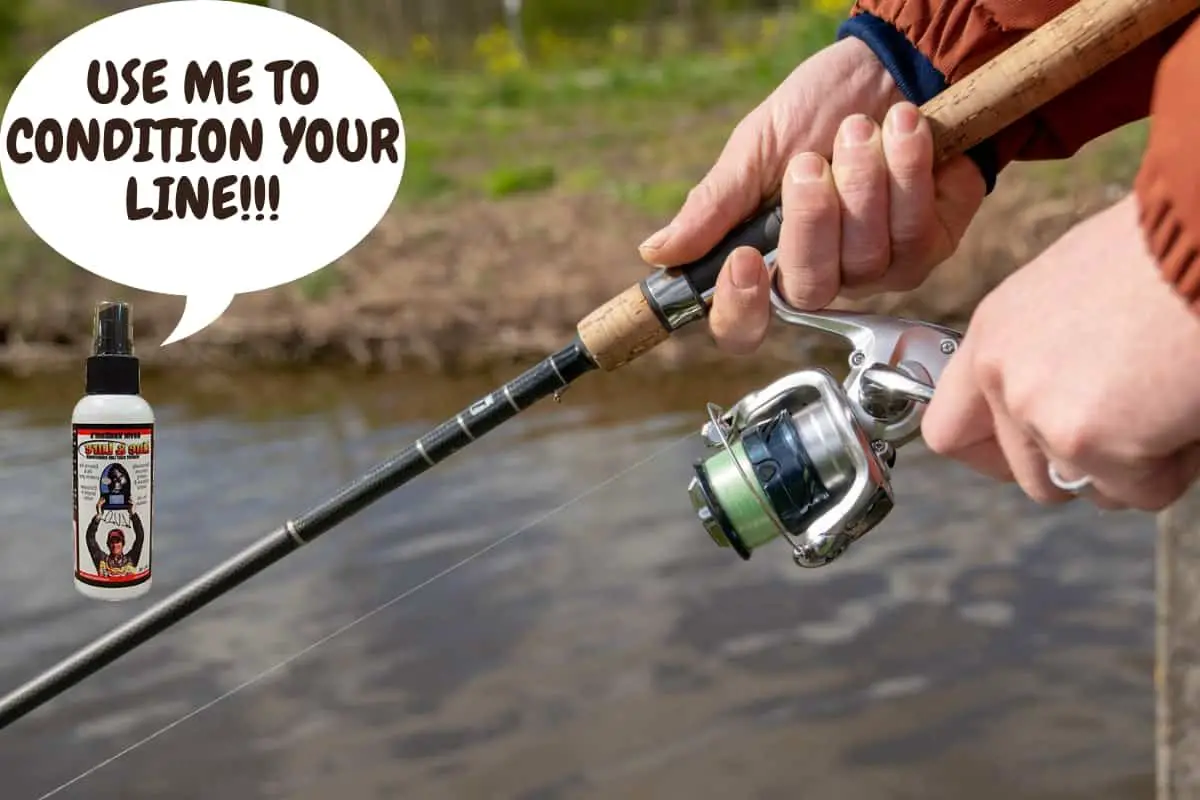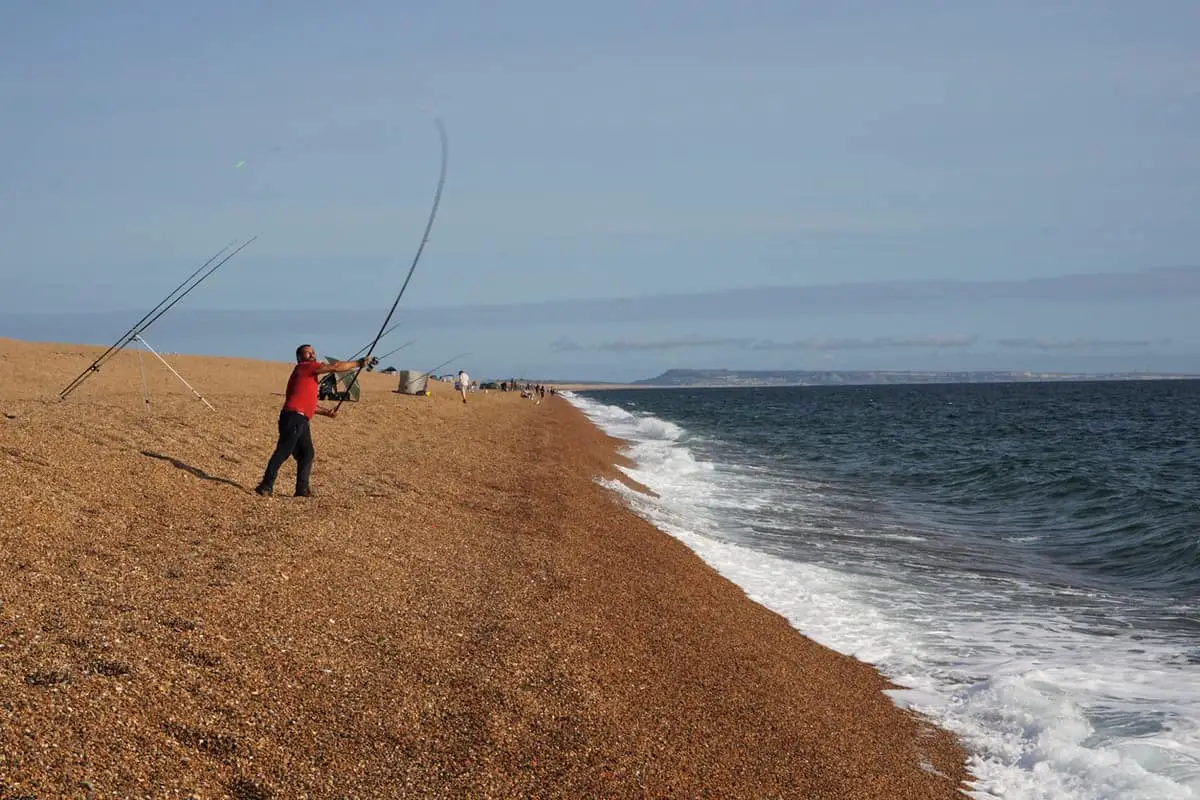
As anglers, we look for all sorts of ways to improve your cast or reduce line memory. During your search, you might have heard about fishing line conditioners. But do fishing line conditioners work as advertised, do they actually make a big enough difference, and are they really worth it?
Line conditioners are a spray you squirt on your fishing line while on the reel. Line conditioners will coat and soften your fishing line allowing you to cast further and reduce line memory. It also provides some protection from the sun’s UV rays.
Many anglers swear by using line conditioners, while others don’t believe it will improve casting distance. However, it seems like most anglers will agree that line conditioners will reduce line memory.
But do line conditioners really live up to the hype? Let’s find out!
A Deep Dive Into Line Conditioners
Can Line Conditioners Reduce Line Memory?
A fishing line can develop line memory over time which can cause the line to twist or curl as it comes off the reel. This can happen for many different reasons, but some of the most common reasons are improper spooling techniques, the fishing line’s age, and the fishing line’s material.
A fishing line made from monofilament or fluorocarbon tends to develop line memory over time. When you spray a line conditioner on these lines, it will help soften the fishing line making it more flexible and to reduce line memory.
Braided fishing tends to maintain its flexibility over time and has very low line memory naturally. So applying line conditioner to braid to reduce line memory is pointless. But there is another reason why you might want to spray your fishing line with a line conditioner.

Can You Increase Your Casting Distance With Line Conditioners?
Whenever you cast your fishing line, many different factors can come into play that can affect your casting distance.
- Casting Techniques
- Rod and Reel Specifications
- Type of Fishing Line
- Air Resistenace / Wind
- Friction
- Lure or Sinker Size
All of these factors ultimately come into play when casting. We do have some level of control over many of these factors. Things like casting techniques will come with practice, and you, as the angler, can select the rod, reel, lure size, and type of fishing line you want to cast with. We don’t have much control over the air resistance and friction.
However, we can reduce the friction that our fishing line will experience when casting by applying line conditioners. One of the most common claims about line conditioners is that they will reduce friction, allowing you to cast further.
So I decided to put this to the test and conducted a little experiment. I compared my casting distance by making a few casts without a line conditioner and a few casts with a line conditioner. Here are my results:
| Casting Distance Without A Line Conditioners | Casting Distance With A Line Conditioner | |
|---|---|---|
| Cast #1 | 85 Yards | 88 Yards |
| Cast #2 | 95 Yards | 95 Yards |
| Cast #3 | 87 Yards | 87 Yards |
| Cast #4 | 92 Yards | 94 Yards |
| Average: | 89.75 Yards | 91 Yards |
According to my little experiment, there was only a 1.25-yard (3.75 ft) difference between casting without and with a line conditioner. This result hardly seems like anything to rave about, so I decided to reach out to other anglers to see if line conditioners have made any major improvements to their castings distance.
The replies that I got were mixed. Some anglers said it did not make any noticeable changes and stopped using line conditioners because they felt it was not worth the money. Other anglers reported that it made a noticeable difference in their casting distance.
I noticed that many experienced anglers who reported that line conditioners didn’t help improve their casting distance also said they properly maintain their rod and reel.
If you properly maintain your rod and keep your reel well greased it will perform better or on par than applying line conditioners.
Can Line Conditioners Protect Your Fishing Line From The Elements?
If you’ve ever gone ice fishing before, you’ll know that your line can freeze and that ice can make your line stick together. Applying a line conditioner to your fishing line will form a thin protective layer on the fishing line, making it difficult for ice to form and grab onto your fishing line.
If you’re fishing in extreme sunlight, the UV rays from the sun may damage your fishing line, especially if you’re using a monofilament fishing line. Applying some line conditioner to your fishing line will help provide some protection against the UV rays.
How effective are line conditioners to protect your fishing line against UV rays? Many resources and anglers report that line conditioners provide some level of protection but are unclear as to how much. Personally, I don’t think it provides much protection. Eventually, the protective layer will rub off as the line rubs on itself in the reel and as it rubs along the fishing rod’s guides.
What Are The Negatives With Line Conditioners?
Line conditioners don’t have many disadvantages. People either love it or feel like it really does not help with their fishing.
There are only three real negatives that I noticed when using line conditioners which are:
- If you don’t allow enough time for the line conditioner to soak into the line before using it, it can splatter the conditioner all over your reel. As you cast and reel, the line condition residue will fly off the line and splatter all over your reel and can get on your reel pedals, making them a bit slippery. Not to mention it’s annoying to see oil marks on your reel.
- All line conditioners that I’m aware of say that line conditioners can be harmful or fatal if it gets in your mouth or eyes. Personally, I feel uncomfortable putting something on my fishing line that I have my hand touching all the time. Not sure how actually harmfully line conditioners can be, but I’m not willing to find out.
- Line conditioners can attract dirt, especially if the conditioner has not fully soaked into the line and cured. Many anglers have stated that this can be a bigger problem with some brands compared to other brands. I’ve not noticed this, but yet again, I don’t really use line conditioners a whole lot.
Can You Use Line Conditioners on Monofilament Fishing Lines?
Line conditioners work great with monofilament lines because they will develop line memory, become brittle over time, and the line conditioners will provide some protection against UV rays.
Can You Use Line Conditioner on Fluorocarbon Fishing Lines?
Fluorocarbon lines have the highest line memory, and line conditioners can help minimize the line memory for a better fishing experience.
Can You Use Line Conditioner on Braided Fishing Lines?
Since braided fishing lines don’t have line memory and are not as sensitive to UV rays exposure, line conditioners won’t benefit. Braided Lines have very different properties; a line conditioner specifically designed to be used on braided fishing lines called Braid Aid, designed only to increase casting distance.
What Is The Best Line Conditioner On The Market
I have tried several different line conditioners over the years and found that the [sherpa id=”31b3226b”] works the best. I found that the differences between the brands are not huge, but I found that I got a better performance using the line conditioner.
I asked many anglers which brand of line conditioner was their favourite to use. Here were the results that I received.
- KVD
- Reelsnot
- Reel Magic
How To Apply Conditioner To Your Fishing Line
When applying line conditioner, I prefer to apply the conditioner the night before I go fishing. This way, it gives enough time for the conditioner to soak and dry on the line.
How do I apply line conditioner to my fishing line? I soak a rag with line conditioner and run the fishing line through it.
Remember to wear gloves to protect your skin and to remind you to not touch your face
By doing this, you will be physically removing the light “chalk” coating produced after the fishing line is made at the factory. Removing this coating will ensure the fishing line is properly applied while ensuring an even coating of conditioner on the line.
However, this method takes time. Another way to apply a line conditioner that is much faster is to spray the line with the conditioner directly while still on the reel. But it isn’t easy to apply an even coat on the line, and you might get sections of fishing line that are not coated.
Substitutes For Line Conditioners
Some people use other common products as line conditioners. This is not necessary, but some people prefer these substitutes, and they may even work as well.
The best homemade line conditioner substitute is a pure silicone spray. Many commercial brands of fishing line conditioner contain silicone as one of the main ingredients, so using a pure silicone spray will have a similar effect.
Some anglers have actually claimed that hair conditioners can work pretty well. Hair conditioners contain a fair bit of silicone as well. But pure silicone spray will work much better than hair conditioners because of the higher concentration of silicone. Apply it the night before and clean most of it off with a rag before you put it away.
A much more controversial option is WD40. WD40 is a harmful chemical and shouldn’t be going in the water. But how dangerous is WD40 for the fish or environment is unknown. Even if only a small amount of WD40 ends up in the water is still not the best idea.
Another odd choice is melted wax which can work very well if you’re trying to avoid the line from absorbing water if you’re using monofilament.
You might also use a rope waterproofing product to treat your line, which works best if you’re using a braided fishing line.
Are Line Conditioners Worth It?
If you are experiencing a lot of line memory, then using a line conditioner has been proven to be very helpful in reducing it. But, if you’re looking for ways to improve your casting distance, there are some debates about whether line conditioners are really that effective.
I have tried line conditioners, and I’m not a fan of them if I’m trying to increase my casting distance. But many anglers feel like line conditioners really do help with increasing your casting distance. My thoughts are that if you are curious about using line conditioners, then give it a try. A bottle of conditioner will be about $10, so it won’t break the bank to give it a try, and it will last you a long time.
Happy Fishing & Tight Lines!
